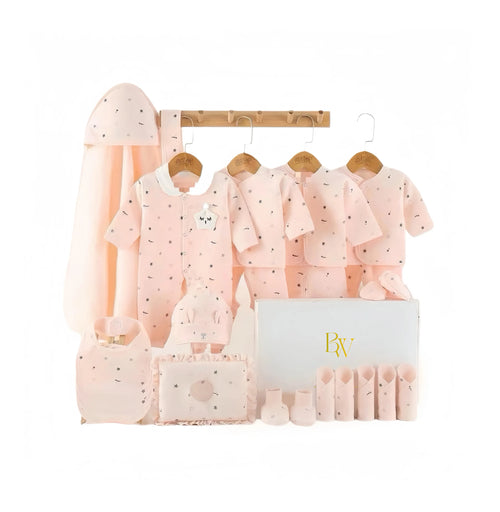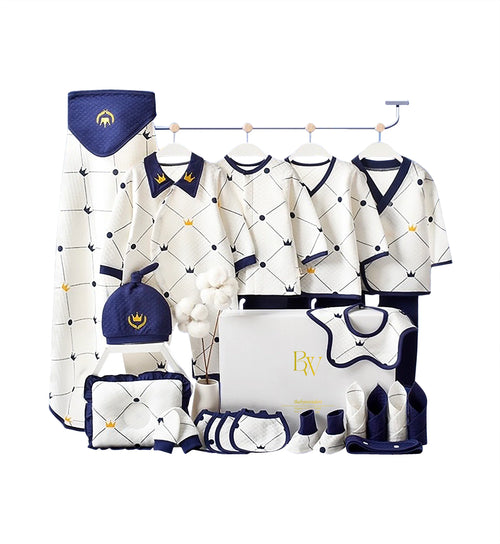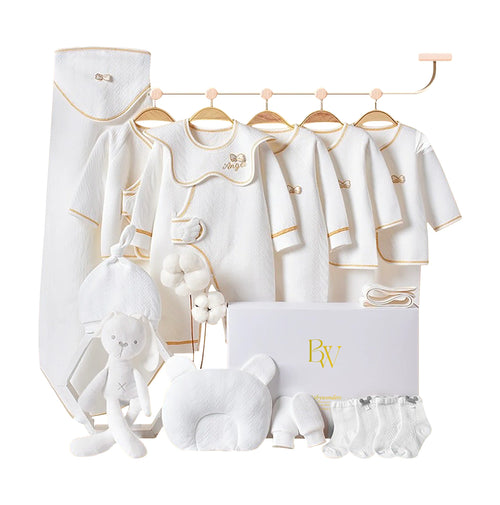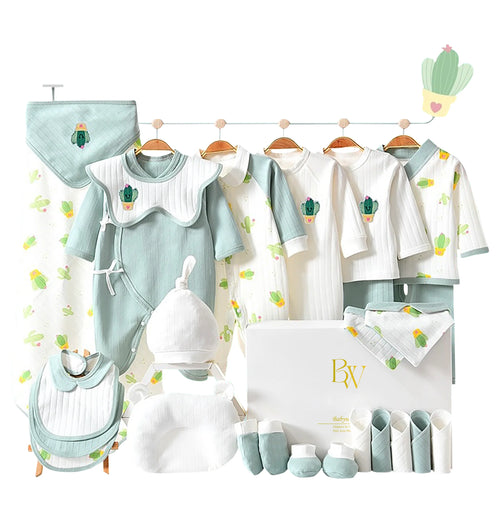
Bringing a new baby into the world is a magical and life-changing journey—but it also comes with plenty of preparation. Whether you're a first-time parent or growing your family, knowing how to prepare for a newborn can ease anxiety and create a smoother transition into parenthood.
This comprehensive guide covers everything you need to know, from setting up your home to organising your finances. Plus, we’ll share trusted tips, helpful links, and gift ideas to make this new chapter joyful and well-prepared.
Timing Is Everything: When to Start Preparing
When should you begin preparing for your baby’s arrival? Ideally, start during the second trimester, around 14 weeks. By spreading out tasks, you avoid the last-minute stress and can focus on enjoying your pregnancy journey.
This is also a great time to start browsing starter gift sets for newborns or essential baby bundles to ensure you have everything in place.
Creating a Nest: Preparing Your Home for Baby
Your home will soon become your baby’s world—so comfort, organisation, and safety are key.
1. Sleeping Arrangements
Decide whether you’ll use a crib, Moses basket, or co-sleeping cot. Ensure it meets UK safety standards and is placed in a quiet, secure spot.
2. Meal Prep for You
Freezer-friendly meals are lifesavers in the postpartum weeks. Preparing in advance helps you stay nourished while bonding with your baby—without the stress of daily cooking.
3. Declutter and Organise
Clear spaces where you’ll spend the most time—especially the living room and nursery. A calm, tidy environment makes a world of difference in those early days.
4. Baby’s Space
Set up a dedicated space with essentials like nappies, wipes, clean clothes, and feeding gear. Stock it with items from a curated baby gift collection for all-in-one convenience.
Preparing Mum for the Journey Ahead
Becoming a mother brings physical, emotional, and mental changes. Here’s how to support your wellbeing:
Create a Birth Plan
Outline your labour and delivery preferences but remain flexible for any changes. Communicating your plan helps your healthcare team support your wishes.
Get Breastfeeding Ready
Attend a breastfeeding class and gather essentials like a pump, nursing bras, and nipple cream. Even if plans change, preparation boosts confidence.
For guidance, refer to the NCT’s breastfeeding support.
Postpartum Essentials
Stock up on recovery items—postpartum pads, sitz bath herbs, comfy clothes, and sleep-friendly outfits like soft baby clothing that match your baby’s.
Mental Health Awareness
Understand the difference between baby blues and postpartum depression. Keep an open line of communication with your partner and midwife, and explore support options like the NHS mental health in pregnancy resources.
Supporting Fathers on the Parenthood Journey
Fathers are essential, active participants in this journey. Here’s how they can prepare too:
-
Read & Research: Books like The Expectant Dad's Handbook offer valuable insight.
-
Plan Paternity Leave: Coordinate time off to support your partner and bond with your baby.
-
Understand Breastfeeding: Learn how to assist with feeding, even if not directly involved.
-
Take On Daddy Jobs: Diaper changes, baby baths, and cuddles create strong early bonds.
The Ultimate New Baby Checklist
Having the right gear ready removes guesswork and lets you focus on your baby’s needs.
🍼 Travel Essentials
-
Infant car seat (installed before due date)
-
Pram or travel system
-
Nappy bag
🧷 Diapering Products
-
Nappies
-
Wipes
-
Rash cream
-
Changing mat or table
🛁 Bathing Gear
-
Baby bathtub
-
Gentle baby soap
-
Soft towels and washcloths
🩺 Baby Health Products
-
Saline nose drops
-
Thermometer
-
Baby nail clippers
-
Humidifier
🎁 Clothing & Accessories
-
Bodysuits and sleepsuits
-
Swaddles or blankets
-
Hats and socks
For top-rated picks, browse our best gifts new parents love to see what other families swear by.
Emotional, Physical & Financial Preparation
Sleepless Nights
Plan for shifts or rest opportunities—especially in the first few months. Be kind to yourselves.
Learn About Newborn Behaviour
Understand feeding cues, growth spurts, and newborn sleep patterns to set realistic expectations.
Prepare for Relationship Changes
Having a baby changes dynamics. Talk openly, check in often, and support each other.
Self-Care Plans
Even 10 minutes of alone time or fresh air can refresh your perspective. Don’t neglect yourselves.
Financial Readiness
-
Understand maternity/paternity leave entitlements
-
Budget for recurring baby costs
-
Start a small savings pot for your baby’s future
Final To-Dos Before Baby Arrives
Here’s your final countdown checklist:
-
✅ Install the car seat
-
✅ Choose a paediatrician
-
✅ Take an infant CPR or baby safety class
-
✅ Pack your hospital bags (by week 34–36)
-
✅ Plan how and when to announce the birth
-
✅ Discuss and set visitor boundaries
Looking for latest baby gift ideas for the hospital bag or baby’s first photos? We've got you covered.
Conclusion
Welcoming a newborn is a beautiful, life-altering moment—and the more prepared you are, the more you can savour it. From practical home setups to emotional readiness and curated essentials, this guide supports you every step of the way.
Whether you’re organising the nursery, building your checklist, or picking out a luxury baby gift set for your little one, every small step helps create a smoother journey.
Explore more at BabyWondersUK—your trusted partner in thoughtful, stylish, and useful gifts for new parents.







